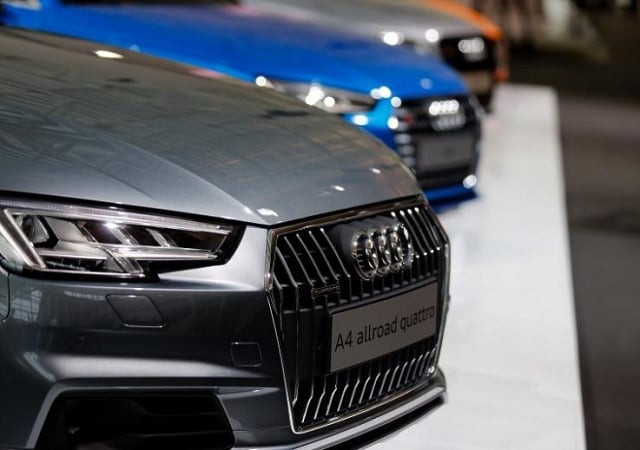Audi software can distort emissions in tests, VW says
Automatic transmissions of certain Audi models shifted more rapidly and in a way that would lower CO2 emissions

Audi cars during the company's annual news conference. PHOTO: REUTERS
Germany's Bild am Sonntag newspaper said a week ago that the California Air Resources Board (CARB) had this summer discovered cheating software in an older Audi model, which is unrelated to the device that triggered last year's diesel emissions test-cheating scandal at parent VW.
The software in CARB's discovery lowered carbon dioxide (CO2) emissions by detecting whether a car's steering wheel was turned as it would be when driving on a road and was used in diesel and petrol models in Europe for years, Bild had said.
Fuel Leaks: VW, Audi recall 334,000 vehicles
"Adaptive shift programs can lead to incorrect and non-reproducible results" when the cars are tested, VW said by email on Sunday in response to an article published in Germany's Sueddeutsche Zeitung on Saturday.
If the software that controlled the automatic transmissions of certain Audi models detected testing conditions, the cars shifted more rapidly and in a way that would lower emissions of CO2 as well as nitric oxides, Sueddeutsche Zeitung said, citing a confidential VW document.
"Audi has explained the technical backgrounds of adaptive shift programs to the Federal Motor Vehicle Authority KBA and has made available technical information," VW said, adding there will be more talks with the KBA, which has been commissioned by the German government to investigate the reported irregularities at Audi.
Audi favours electric cars, services in new strategy: sources
So-called adaptive transmission control is intended to provide better performance by improving fuel economy and reducing shifting frequency, experts say.
"In normal use, these adaptive systems support the driver by adjusting the gear-shifting points to best adapt to each driving situation," VW said.
Earlier on Sunday, Bild reported that the Environmental Protection Agency (EPA) had opened an investigation into Audi over the latest reported software discovery and next week will hear senior VW group engineers, without elaborating.
VW and Audi declined comment on Sunday, as had EPA spokesman Nick Conger on Saturday.
But two people briefed on the matter said the US government is asking questions about it and whether it constitutes a defeat device in gasoline-powered vehicles.
The EPA and CARB are currently focused on reaching agreement with VW on how to resolve 85,000 3.0 liter 2009-2015 diesel Audi, Porsche, and VW vehicles that emit up to nine times legally allowable pollution levels ahead of a Nov. 30 court hearing in San Francisco.
VW's Audi step up efforts to offer more digital services
VW submitted proposed fixes for larger Porsche, Audi and VW diesel vehicles earlier this year and has been in intensive discussions with US and California regulators.
There are also talks ongoing between VW and lawyers for the owners in an effort to reach agreement on how much compensation owners may get. Owners of 2.0 liter polluting vehicles received $5,100 to $10,000 in compensation - in addition to a buyback offer.
At least two class-action lawsuits have been filed against Audi in the US over the issue. One lawsuit says the CARB has "determined that Audi had also surreptitiously installed a gearing related defeat device in the Class Vehicles. The defeat device was used to circumvent the class vehicles' emission control systems that exist to comply with Clean Air Act emissions standards."
CARB has declined to confirm it is investigating, but both it and EPA have said they have stepped up the review of vehicles in the wake of VW's diesel cheating.



















COMMENTS
Comments are moderated and generally will be posted if they are on-topic and not abusive.
For more information, please see our Comments FAQ